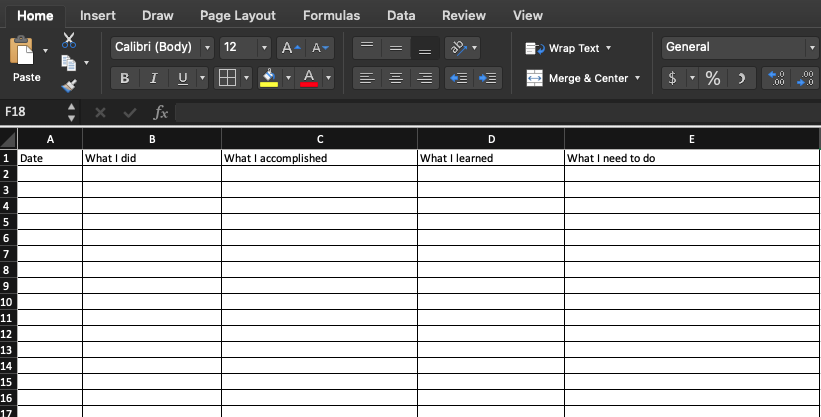You came to your senses and realize that you need a daily work task log template so that you understand your business impact.
This is one of the first few steps you’re taking that will have a huge impact on your career. When you start looking at business in this sense, you start to be more metric and output driven.
There’s a difference between busy work and work that provides value. Busy work can be work that delivers literally no value and has no tangible outcome to the company. You could be providing the same output to the company by not even doing busy work!
This is why it’s so important to keep a daily work task log – you understand what exactly it is the value you’re bringing. When it comes to performance reviews or negotiating for a raise, you will feel more compelled and justified to do so because you have this ammo to use.
The template you should be using to keep track of your daily tasks

We always recommend the simplest solutions such as the resume we use and the interviewing frameworks we provide.
The daily work task log template is no different and is very different as well.
We recommend creating a template using Microsoft Excel and capturing these key areas as columns:
- Date
- What you did
- What you accomplished
- What you learned
- What you need to do
Date
Day by day you need to be tracking what you were working on. Each row will represent the tasks you’re doing by the date. You will continue to do this day by day and watch how the benefit of this compounds over time.
The real benefits of life come with compound interest – this is no different.
What you did
This is the physical output that you produced – such as the excel sheet, word document, design drawing, presentation, etc.
These deliverables will be associated with high level metrics and you will need to learn the direct value of what it is you’re doing.
What you accomplished
This is what you accomplished, not just what you did.
What you accomplished consists of the result or metric that you managed to succeed based on what you did.
Again, look at metrics such as dollar value, revenue, budget, efficiency and see how your work ties into this.
This is not that difficult to do when you change the lens from a worker to how an executive sees things.
What you learned
Don’t forget to put what you learned in your daily work task log as well.
What you learned can consist of calculations, subject matter, or anything that further aids in your growth and development as a worker.
Documenting what you learned over time has massive benefits and makes it very easy to recall.
It’s too easy to forget information otherwise.
What you need to do
This is how you become accountable when it comes to meeting your specific deliverables. Whenever an action comes up that you need to do, write it down. Of course, the action must be important and not just be busy work.
I like to keep the actions text in my spreadsheet red so that it shows urgency.
Showing urgency with what it is you’re working on makes it more likely for you to get the specific action item complete.
Why you should keep a work task log
You need to keeping a daily log of the tasks you do at work all times. This is essential to understand your business impact, gives you things to talk about when it comes performance reviews, and makes for good resume writing material.
It’s very easy to forget the stuff that you do day by day, especially in a few years from now.
I hugely regret not doing this earlier in my career.
Had I done this earlier in my career, I would have a much greater ability to recall what specifically what I would be doing.
This makes it easier for you to write bullet points for your resume and recall stories for interviewing.
In interviews, you will be required to answer questions using the STAR framework, as this will differentiate you from other candidates.
Same with your resumes – specifying your business impact and how you saved the company money is huge.
How to use a task log for performance reviews
When it comes time for performance reviews, make sure to review the daily task long that you’ve been working on.
Understand the specifics of your business impact such as the dollar value of the work you oversee.
This will make it much easier for you to ask for raises and promotions, especially when the dollar value of the work that you’re doing exceeds expectations. Companies will have various cost objectives associated with employees, groups, departments, sectors, and you need to be doing what you can to hit those metrics.
As you climb up in the corporate ladder, the business impact of your work is critical to the success of both your position and the company that you’re working for.
How to use a task log to write your resume
Use the items in your daily task log to write bulletpoints in your resume.
You should be writing bulletpoint in your resume using the Project, Action, Result (PAR) or Subject, Action, Result (SAR) framework.
The project or subject is the high-level “what” that you are working on. This is the industry, macroeconomic principle, or the overview of what you’re working on.
The action is what you’re specifically doing for that project, industry, task, etc.
The result is what was the outcome and this needs to be quantifiable – otherwise it can’t be tracked.
You need to show results that include:
- Revenue
- Budget
- Cost Savings
- Efficiency Improvement
- Time Savings
And each item in your resume needs to somehow reflect the improvement of these – this is the framework that puts you in the Top 1% of job applying candidates.
If you haven’t been doing this at all, this is why you’re likely not getting interviews.
How often should you write in your task log
This needs to be done daily. At the end of your work day, you need to be filling out your task log. Make it as detailed as possible.
You will be organizing your task log in separate excel sheets.
Writing what you did daily in a task log will make it easy to find items that you’ve been working on.
If you’re in the situation where you need to recall certain information, this can easily be looked up using CTRL + F.
This is why I regret not doing this much earlier in my career. Had I done this much earlier, information would be much easier to recall and I’d have so much more ammo and have direct, tangible information to present.
You are leaving so much on the table if you don’t keep items in a daily task log.
What kinds of things should you keep track of in a task log?
Keep track of everything – the spreadsheets that you work on, the word documents, moving goods, receiving, designing, drawings, presentations.
Literally, at the end of each day, write everything that you did. Be as detail oriented as you want with it, or be as high level as you want.
Ultimately, this is designed by you, for you, so that you can use to navigate promotions and increases in your career.
If you need to be very detailed in filling out your daily work log template, then do so.
If you need to be high level and that’s good enough for you then feel free to do that as well.
You might even be unsure of which is better – this is why you need to try and test.
Theory is not as good as real time test data.
About the author

Kazuyoshi Fujimoto, PE
Founder | Engineering Career Coach | Principal Mechanical Engineer
Kazu oversees all of ultmeche’s engineering services. He provides consulting such as resume reviews, rewrites, mock interviews, and all services career related. Additionally, Kazu performs consulting work regarding Oil & Gas, Automotive, and Aerospace & Defense. Kazu is licensed as a professional engineer in the state of California and has 9+ years of experience in Oil & Gas, Automotive, and Aerospace & Defense.
